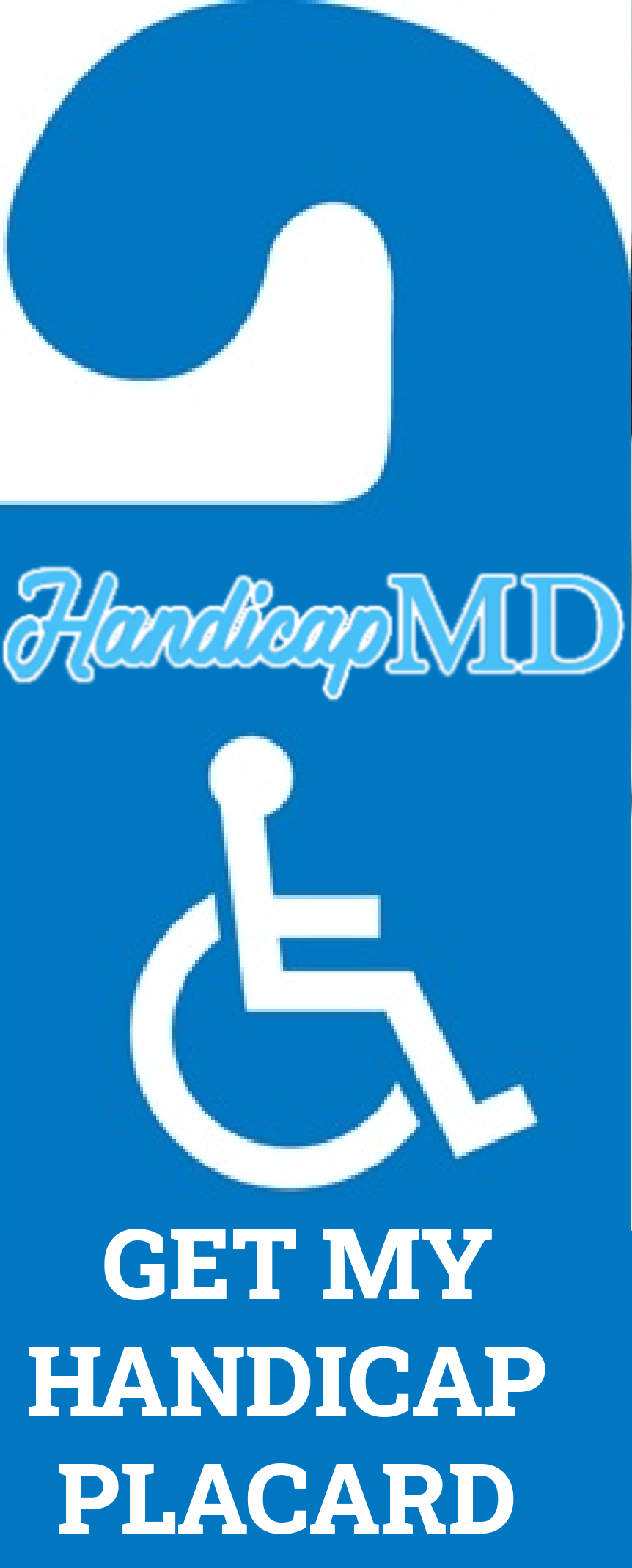
How to get a disabled parking permit in Arizona (AZ)
Eligibility
How to obtain a permit
Fee
Validity / expiration of permits
Renewals
Lost, stolen, or damaged placards
Where to hang the placard
In a fast-paced world, accessibility for everyone is paramount. When it comes to mobility, the state recognizes the importance of providing disabled individuals with convenient solutions. HandicapMD make it easier than ever to obtain an Arizona disabled tag. In this guide, we will walk you through the process, step by step, ensuring you have all the information you need.
Before diving into the details, let's clarify the basics. A disabled parking permit, often referred to as a handicap card, allows individuals with disabilities to park in designated accessible spaces. These tags are issued by the Department of Transportation Motor Vehicle Division (ADOT MVD). In this article, we will explore the procedures for obtaining an online disabled tag and answer frequently asked questions to make the process as smooth as possible.
Eligibility - Who qualifies?
An individual qualifies if they:
- Cannot walk 200 feet without stopping to rest
- Use portable oxygen
- Have a Class III or Class IV cardiac condition
- Suffer from an arthritic, neurological, or orthopedic condition severely limiting their ability to walk
- Have a severe audio handicap
- Suffer from a restrictive lung disease with low arterial oxygen tension at rest or reduced forced expiratory volume
- Depend on an assisting device like a brace, crutch, cane, wheelchair, prosthetic, or another person
- An organization qualifies for a disabled card if their registered vehicle primarily transports physically disabled persons and displays the card or international symbol of access special plates. Trailers are not eligible for tags.

How to Obtain a Permit:
Obtaining a card involves a straightforward process. Follow these steps to ensure you receive the necessary card:
Consult a Licensed Healthcare Provider: Start by scheduling an appointment with a licensed healthcare provider. This could be a physician, nurse practitioner, or another qualified medical professional. During your visit, discuss your medical condition or disability that necessitates a handicap tag.
Medical Certification Form: Request the healthcare provider to complete the official "Medical Certification for Disability License Plates/cards" form. This essential document is available in two convenient ways:
- Download Online: You can easily download the form from the official Department of Transportation (ADOT) website. It's accessible in a printable format for your convenience.
- Visit an ADOT Office: Alternatively, you can obtain a physical copy of the form from any ADOT office. Check the ADOT website for the nearest office location.
Submit Your Application: Once you have the completed Medical Certification form in hand, it's time to submit your application. You have two options:
- In-Person Submission: Visit your local ADOT office in person to submit the form. Friendly staff will assist you through the process and ensure your application is complete.
- Mail Your Application: If you prefer not to visit in person, you can mail the completed form to the appropriate ADOT office. Make sure to include all required documentation.
Identification: Along with your application form, always remember to provide a valid form of identification. This helps confirm your identity and ensures that the tag is issued to the correct individual.
Review and Processing: After submission, ADOT will review your application and verify the medical certification. Once approved, they will issue your handicap sticker.
It's important to note that the process is designed to be accessible and straightforward, aiming to provide necessary accommodations for individuals with disabilities. Be sure to check the ADOT website for any updates or specific details regarding the application process, as requirements may evolve over time.
Fee:
there was no fee associated with obtaining a tag. This means that eligible individuals could acquire the tag without incurring any direct costs.
However, it's important to note that fee structures and policies can change over time. Therefore, it is advisable to visit the official Department of Transportation (ADOT) website or contact your local ADOT office for the most current information regarding fees, if any, associated with handicap tags.
Keep in mind that some states may charge nominal fees for stickers, while others continue to offer them free of charge as a service to individuals with disabilities. Always check the latest information to ensure you are aware of any potential changes in the fee structure and to have the most accurate details for obtaining your handicap tag.
Validity / Expiration of Permits:
When you obtain a handicap sticker, it's essential to be aware of the validity and expiration periods, as these can vary depending on the type of sticker issued:
Temporary : Temporary are typically issued with a validity period of up to six months. These are often provided to individuals who have a temporary medical condition or disability that impairs their mobility for a limited duration. The specific expiration date will be clearly indicated on the card itself.
Permanent: Permanent offer more extended validity. They are typically issued with an expiration period of up to eight years. These cards are granted to individuals with long-term or permanent disabilities that significantly limit their ability to walk. Similar to temporary cards, the expiration date will be clearly stated on the card or may also apply to license plates, if applicable.
It's important to emphasize that adhering to the expiration dates on handicap cards is crucial. Expired tags may not be used, and continuing to use an expired tag could result in fines or penalties. Therefore, individuals with disabilities should be attentive to the expiration date of their tag and plan accordingly to renew it in a timely manner
Renewals:
Renewing a tag is essential to ensure continued access to the vital accommodations that individuals with disabilities rely on. To renew your tag, follow these important steps:
Consult Your Healthcare Provider: When your existing tag is nearing its expiration date, schedule a visit to your healthcare provider. This can be a physician, nurse practitioner, or another qualified medical professional. During this visit, discuss your medical condition or disability and its impact on your mobility.
Medical Certification Form: Request your healthcare provider to complete the "Medical Certification" form anew. This form serves as the official certification of your ongoing need for the. You can obtain this form from the official Department of Transportation (ADOT) website or from any ADOT office.
Submitting Your Renewal Application: Once the Medical Certification form has been completed, it's time to submit your renewal application to your local ADOT office. You have two primary methods to accomplish this:
- In-Person Renewal: Visit your local ADOT office in person to submit your renewal application. The office staff will guide you through the process and ensure that your application is complete.
- Mail Your Renewal Application: Alternatively, if you prefer not to visit in person, you can mail the completed form to the designated ADOT office. Be sure to include all required documentation.
Identification: Similar to the initial application, provide a valid form of identification along with your renewal application. This step helps confirm your identity and ensures that the tag is issued to the correct individual.
By adhering to this renewal process, you can maintain continuous access to the benefits of your tag. Always check the ADOT website for the latest updates, as renewal requirements and procedures may evolve over time. Timely renewal is essential to ensure that individuals with disabilities can consistently use their tags for accessible parking.
Lost, Stolen, or Damaged:
In the unfortunate event that your card is lost, stolen, or damaged, it's crucial to take prompt action to address the situation and ensure continued access to accessible parking. Follow these steps to manage the situation:
Contact Your Local ADOT Office: Reach out to your local Department of Transportation (ADOT) office as soon as you realize that your card is no longer accessible. They will provide you with specific guidance and instructions on how to proceed.
Request a Replacement: Inform the ADOT office of your need for a replacement card due to loss, theft, or damage. They will guide you through the replacement process. Be prepared to provide essential information, such as your personal details and the original card's identification number, if available.
Explanation of Circumstances: Depending on ADOT's policies and requirements, you may be asked to provide a statement explaining the circumstances surrounding the loss, theft, or damage of your sticker. This statement helps in verifying the need for a replacement.
Replacement Fee: Be aware that there might be a replacement fee associated with obtaining a new card. The fee can vary, so it's essential to inquire about the specific costs when contacting your local ADOT office. Payment methods and acceptable forms of payment will also be clarified during this process.
Collecting Your Replacement: After completing the necessary paperwork and fee payment (if applicable), you will receive your replacement card. Ensure that you keep it in a secure and easily accessible location in your vehicle to maintain its functionality.
Remember that promptly addressing the loss, theft, or damage of your card ensures that you can continue to utilize accessible parking spaces legally and conveniently. Always reach out to your local ADOT office for the most up-to-date information and detailed instructions specific to your situation.
Where to Hang the Placard:
Using your card correctly is essential to ensure accessibility and compliance with parking regulations. Follow these guidelines for the appropriate placement of your card:
Hang from the Rearview Mirror: Hang your card from the vehicle's rearview mirror. This location provides easy access and visibility to law enforcement, parking enforcement personnel, and fellow drivers.
Position the Expiration Date and Symbol Outward: When hanging the card, ensure that the side displaying the expiration date and the recognizable disability symbol faces outward. This orientation allows authorities and attendants to quickly identify the validity of your tag.
Visibility is Key: Make sure that the card is placed in such a way that it remains clearly visible at all times. Avoid obstructing it with objects or items that may obscure its visibility from outside the vehicle.
Remove While Driving: While the card should be prominently displayed when parked in a designated handicap space, it is essential to remove it from the rearview mirror when the vehicle is in motion. This ensures that it does not obstruct your view while driving and adheres to safety regulations.
Stow Securely When Not in Use: When you're not using the card, store it securely within your vehicle to prevent loss or damage. Keeping it in a safe and easily accessible location ensures that it's readily available when needed.
Avoid Misuse: It's crucial to use your tag responsibly and only when the individual with the disability is present and requires accessible parking. Misuse of the placard can result in fines or penalties.
By following these guidelines for proper placement and use, you can ensure that your tag serves its intended purpose effectively, providing accessible parking options when needed and promoting accessibility for individuals with disabilities. Always adhere to local regulations and be considerate of others who rely on these spaces for their accessibility needs.
Please verify this information with the Department of Transportation or check their official website for any updates and changes in the process or requirements since my last update in January 2022.
.png)





